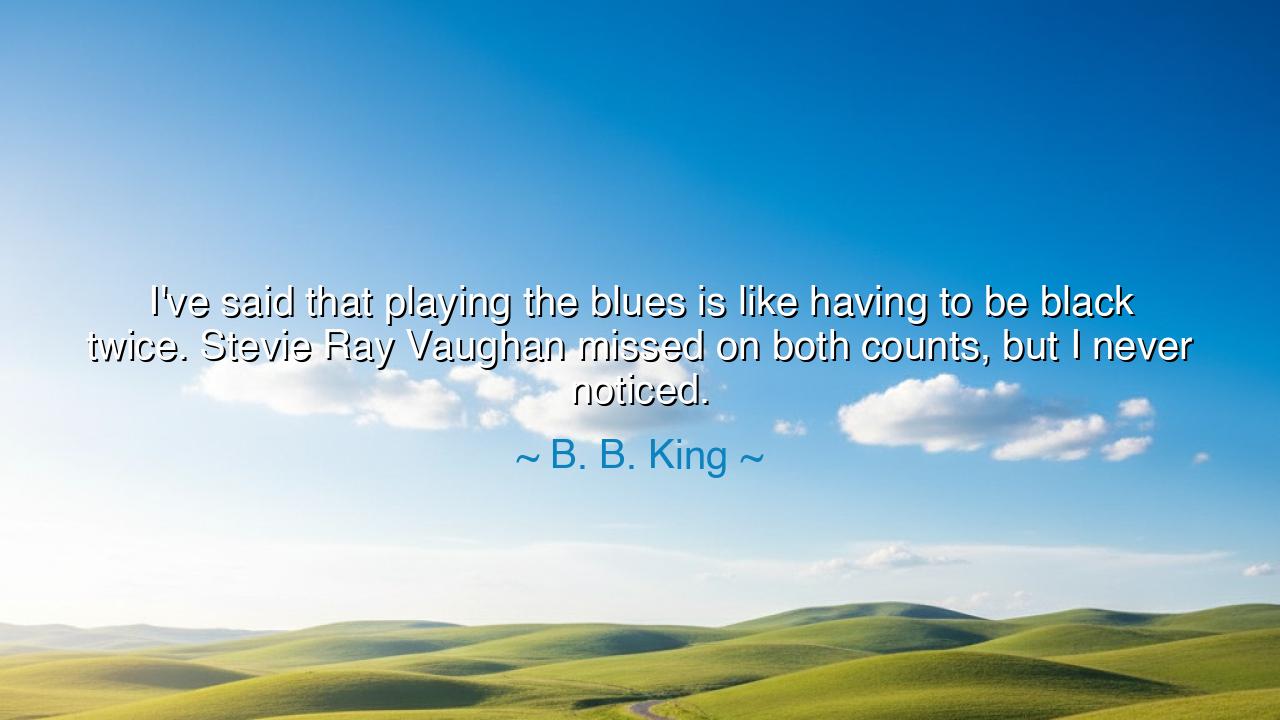
I've said that playing the blues is like having to be black
I've said that playing the blues is like having to be black twice. Stevie Ray Vaughan missed on both counts, but I never noticed.






The words of B. B. King, “I’ve said that playing the blues is like having to be black twice. Stevie Ray Vaughan missed on both counts, but I never noticed,” strike like thunder across the plains of history. They are more than a tribute to a friend; they are a revelation about the essence of the blues, about the suffering, the soul, and the spirit that cannot be faked. In these words, the king of the blues acknowledges both the weight of cultural inheritance and the transcendence of pure artistry. He speaks to us of identity, of authenticity, and of the power of music to bridge divides that the world insists are unbridgeable.
To say that the blues is like being black twice is to declare that this music was born from the furnace of double suffering: the suffering of being human in a world of hardship, and the deeper suffering of being black in a land of chains and segregation. The blues emerged from fields where hands bled on cotton, from nights where freedom was but a distant star, from voices muffled yet burning with song. To carry this sound is not merely to play notes, but to embody the memory of grief and resilience, of survival and defiance. It is an inheritance steeped in pain but also in pride.
And yet, in his words about Stevie Ray Vaughan, King unveils a truth more profound still. Vaughan, a white man from Texas, was not born into that heritage, nor did he know the sting of racial oppression. By blood he missed “both counts.” Yet when he bent his guitar strings and let his soul pour out, the music bore no counterfeit. It carried weight, sincerity, and passion enough that even the master himself could not find fault. B. B. King’s testimony reminds us that while the roots of the blues are bound to history, the branches spread to anyone who can feel, who can ache, who can let music become prayer and lament.
Think of how Beethoven, though deaf, gave the world symphonies that touched upon the divine. He lacked the very faculty his art demanded, yet transcended its absence through the power of spirit. So too did Vaughan cross barriers of race and heritage not through presumption, but through devotion. He did not pretend to own the blues; he gave himself to it wholly, and in return it adopted him. This is the alchemy of true art: it welcomes the stranger who approaches with reverence, even when the world would mark him an outsider.
Thus B. B. King’s words reveal both the sacredness of origin and the generosity of spirit. The blues was born in chains, but it does not chain itself to blood alone. It demands authenticity, not ancestry. It demands honesty, not appearance. It demands that a man put his heart upon the strings and let it weep without shame. In this, Vaughan proved himself a true child of the blues, though not of its bloodline. King, with grace, honored that truth, for he understood that art belongs not only to where it comes from but also to where it goes.
What, then, is the lesson for us? It is this: in life, you may be born far from the roots of a tradition, a people, or a path, but if your heart is sincere and your labor true, you may yet take part in its greatness. Do not be discouraged if others say, “This is not for you.” For if your spirit is humble and your effort genuine, you may become part of something larger than yourself, something that transcends the boundaries the world erects. Authenticity conquers barriers. Passion conquers doubt. Sincerity conquers exclusion.
To walk in this wisdom, keep your heart open to the struggles of others. Honor the origins of what you inherit—never claiming falsely, never erasing—but always giving credit where it is due. Approach every craft, every tradition, every calling with reverence and patience. Do not seek to imitate the surface; seek to embody the spirit. When you do, your work will carry the fire of truth, and even the masters will recognize you.
And so, let B. B. King’s words echo in your soul: though the blues may demand the pain of being “black twice,” it will not reject the one who comes with a true heart. The path is not about what you were given at birth, but about what you give of yourself. Be sincere, be devoted, be humble—and the gates of any art, any calling, any destiny will open to you.






AAdministratorAdministrator
Welcome, honored guests. Please leave a comment, we will respond soon